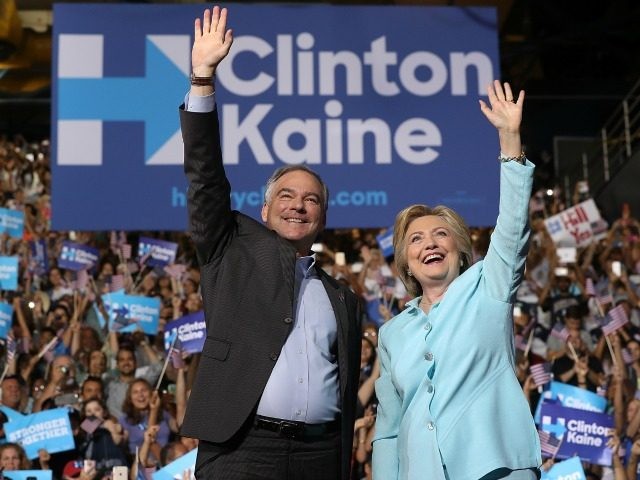Hillary Clinton’s campaign manager John Podesta tells reporters she and Democratic running mate Tim Kaine are “against the TPP before the election and against the TPP after the election.”
Podesta was trying to allay the concerns of Bernie Sanders supporters, along with many others in the Democratic base, that Clinton would follow in the footsteps of her husband if elected this November and press for passage of the Trans-Pacific Partnership (TPP) and other free trade deals.
After all, Bill Clinton built his presidential legacy on a “trade trifecta” that Hillary enthusiastically supported: passage of NAFTA, membership in the World Trade Organization, and opening of the U.S. market to China (via most favored nation status.)
More recently, Hillary Clinton and Kaine both supported the TPP before opposing it. But widespread voter concern on trade, articulated by Bernie Sanders and Donald Trump, has forced her to do an about-face on what she had previously called the “gold standard” of trade deals.
Nonetheless, following Podesta’s bromide, Clinton confidant and Virginia Governor Terry McAuliffe fueled voter doubt when he told Politico that Clinton would come through for the TPP once in the White House. He may be right. Goldman Sachs didn’t pay Mrs. Clinton all those speaking fees for nothing. But McAuliffe was strongly rebuffed by the campaign.
Thus Podesta’s comments and the putdown of McAuliffe offer a superficial palliative for the nervous Democratic base. But DNC rank and file should indeed be suspicious of Hillary Clinton’s real intentions, noting Podesta’s vague puffball on her trade policy: He says that Hillary favors “a new approach” to trade relations. Completely lacking in substance and meaning, this “new” Hillary trade policy is hardly something one can bank on.
President Obama demonstrated similar trade duplicity during his first term, when he concluded free trade agreements with Panama, Colombia, and South Korea — despite touting his opposition to NAFTA during the 2008 campaign.
The hollowness of Clinton’s “new approach” makes the barrage of media criticisms leveled at Donald Trump’s lack of specificity a travesty. Numerous editorial boards have savaged Trump for offering only vague statements on issues. But such criticisms conveniently ignore Trump’s clear statements on trade (one of his three main issues, along with immigration and national security), as well as his clarity of intention to renegotiate trade agreements and eliminate trade deficits. Moreover, Trump has continually declared his opposition to faulty trade policy since the 1980s. No Clinton trade flip-flops there.
And Trump has never backed away from calling for potential tariffs, if necessary to accomplish his goals, even as a slew of opinion pieces have slammed him for suggesting such tactics.
Trump’s position is strong and precise, and makes good sense when one considers that America’s key trade partners (notably China, Japan, South Korea, Taiwan, and Germany — all countries added to a new Treasury Department watchlist of potential currency manipulators this spring) have run roughshod over successive presidential administrations, producing 40-plus years of U.S. trade deficits. Trump is clear: He wants to create jobs at home and prevent the further offshoring of America’s remaining industrial base by halting the cheating and adversarial tactics of our trading partners.
So we have Trump telling us exactly what he wants to do, contrasted with Podesta’s fluff statements. Podesta also sidestepped a question about whether Hillary will go head-to-head with Obama on his desire to push TPP through a lame duck session of the Congress, saying, “That is not our strategy.”
But what, really, is Clinton’s strategy? We have Trump offering quite specific policies, and taking extreme heat for them. Hillary Clinton’s strategy is, apparently, not to be pinned down. In other words, she has adopted a political strategy, not a substantive one. The “best-prepared-person-ever” doesn’t have a trade strategy.
Hillary Clinton wants it both ways on trade, simultaneously placating anti-free-trade Sanders voters and her pro-free-trade Wall Street benefactors with her “read-your-favored-position-into-it” approach.
However, if our failed trade policy is something voters want to change in favor of new wealth generation and job creation, the choice of candidates is clear: The one who actually has a specific trade policy that favors American workers and the American economy. Hint: It’s not Hillary Clinton.
Kevin L. Kearns is president of the U.S. Business & Industry Council (USBIC), a national business organization advocating for domestic U.S. manufacturers since 1933.

COMMENTS
Please let us know if you're having issues with commenting.